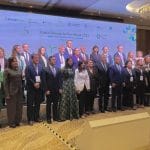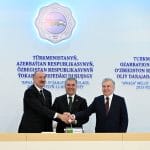The European Union is as dependent on Asian countries, especially China, when it comes to batteries and raw materials for technologies of the future as the EU was dependent on Russia for fossil fuels before the EU Energy Union, European Commission Vice President for Interinstitutional Relations and Foresight Maroš Šefčovič said on July 23, noting that the EU wants wean off China’s raw materials.
“We adopted the new industrial strategy in the spring of this year where we focused on the key industrial areas and I’m glad to say that the European Battery Alliance where many of you are working very, very closely is serving as a kind of inspiration, blueprint for many alliances to come,” Šefčovič told a GLOBSEC roundtable on Central and Eastern Europe energy going green, smart and resilient. New Europe participated in the webinar held online with Šefčovič, European Investment Bank (EIB) Vice President Lilyana Pavlova, and CEOs of companies.
“We just launched one on the hydrogen and I hope that in September we will do the same with alliance for the raw materials and I can compare it that we are almost as dependent on the Asian countries, especially China – when it comes to these raw materials we need for the technologies of the future – as we have been before we started with the Energy Union dependent on Russia when it comes to the fossil fuels,” Šefčovič said.
The Vice President recommended that the industry should focus on anything linked with the infrastructure for the 21st century economy – energy storage, batteries, hydrogen technologies, smart grids, charging stations. “I know the Czech and Slovak distribution companies started this excellent cross-border cooperation and they got also very hefty funding from the European Union to promote project like it,” he said. “These are the projects which should be developed which should be discussed on the national level which should be then, of course, presented to us, the Commission,” he said, adding that the overall transformation of the overall European economy should be green, digital and resilient.
Regarding the European Battery Alliance, he said the alliance offers solutions on how to store energy, how to combine better sources of intermittent electricity like wind and solar with the demand for constant energy flows crossing the borders in Europe. “We realised that without storing the energy, without stocking the energy, without developing the new ways to transport the energy around Europe we would simply not achieve it. Therefore hydrogen, therefore the interconnectors are so important and that brought us, of course, to smart-mobility,” Šefčovič said.
“By 2030, I believe we will have around 70 percent of the low-carbon electricity in our grids so it brings us in a totally different ballgame when it comes to the carbon footprints of electric vehicles. And I simply noticed that we had scooters, buses and more and more cars with electric engines but not coming from Europe but mostly coming from China,” he said.
The Commission Vice President added that the car industry realised very quickly that the aim of the Asian countries is not to export the batteries as commodity. “They want to export electric cars because they have been very well informed about the value that the battery of the car would represent together with the software something like 60 plus percent of the overall value of the car. So, we moved very quickly and I again would like to thank Liliana, the EIB, Andrew McDowell but I would say the while managing board for being so supportive of the battery alliance because I just looked at the latest figures and thanks to the close cooperation between the last three years we managed to channel into the sector covered by the European Battery Alliance around 200 billion euros so that’s massive mobilisation of public and private money,” Šefčovič said.
The Commission Vice President also noted that Europe has quite enough lithium but does not have the mines and processing plants. “We have currently four projects which are developing in a very promising way in Czech Republic, in Portugal, in France, in Spain and if all of them would kick in and be accomplished we would be covering 80 percent of our lithium consumption by our own resources,” he said.
Europe should simply use this opportunity to really leap from what be traditional black economy into the green one, Šefčovič said, adding, “I think that this financial bazooka which was adopted over the weekend should really help us to point to that direction. We need good projects, we need good management of those projects and close cooperation industry, national governments and European level”.
follow on twitter @energyinsider







